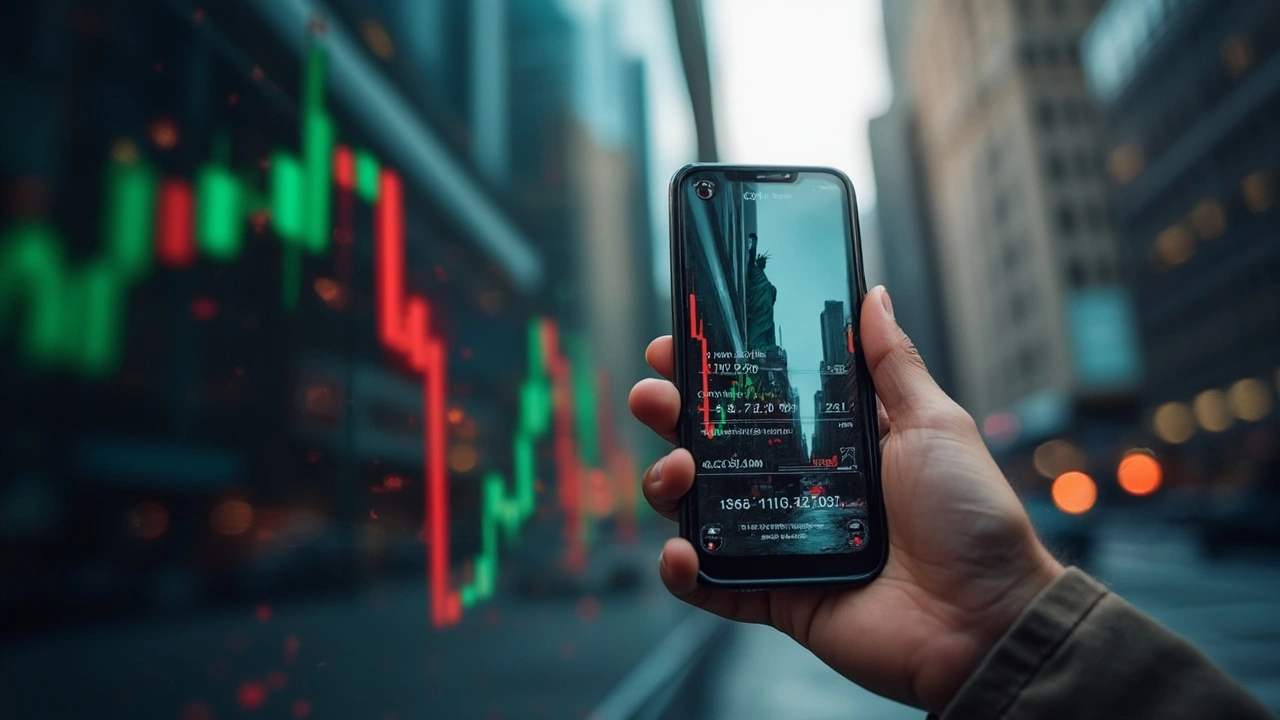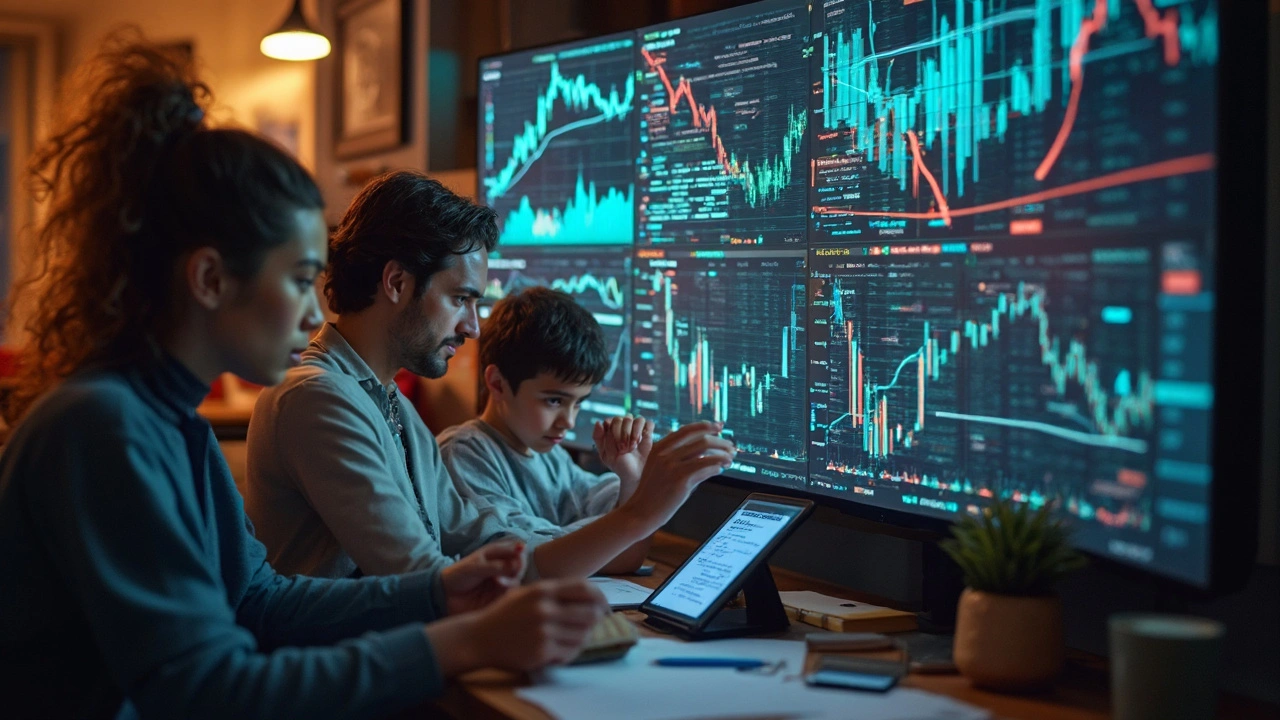Picture this: someone in their twenties sitting at a café, laptop open, not just scrolling but actively making moves in the stock market. That’s not just a dream scenario anymore—there’s a whole wave of regular folks out there, opening up trading apps on their phones, determined to make their money work harder than a savings account ever could. Why settle for pennies in interest when you could aim for double-digit returns? That kind of thinking is changing the game, and it’s clear stock trading is the disruptor personal finance needed.
How Stock Trading Redefined Financial Independence
Think back to your parents or even your grandparents. Their main financial goal? Save up, stash money in a bank account, pray for a decent interest rate, and retire at sixty-five. Fast forward to today and it’s a different ball game. Thanks to the internet, trade commissions that have dropped to zero on many platforms, and a culture that craves instant feedback, stock trading now sits at the heart of many personal finance conversations. The shift is wild. Back in the 1990s, trading stocks meant calling up a broker (yeah, with an actual phone call), and coughing up heaps in fees for each buy or sell order. Data from the Securities Industry and Financial Markets Association shows the average commission on a single stock trade in 1996 was around $50. In 2025, it’s literally zero on platforms like Robinhood, Webull, and E*TRADE. This access is one big reason why more Americans than ever—about 61% according to a 2024 Gallup poll—own stocks, either through direct trading or retirement plans.
Let’s be real, though: buying a handful of shares doesn’t guarantee wealth. The real power of trading is how it flips the old rules on their head. You’re not locked into a bland set-it-and-forget-it approach anymore. You can design your own path, tailor your trades to your risk appetite, and even day-trade if you’ve got tolerance for adrenaline and loss. This shift hands the keys of financial freedom to anyone with some cash, an internet connection, and a willingness to learn.
The Winning Mindset: More Than Just Hype
Sure, the lure of making quick money from the latest meme stock is tempting, but here’s the thing—stock trading rewards the prepared, not the lucky. You need discipline, patience, and a thick skin. Get ready to ride out both surges and painful drops because volatility is the name of the game, especially when markets get jumpy with global headlines or surprise earnings reports. For newbies, there’s a hard truth to grapple with: most short-term traders lose money. According to a 2023 study out of Brazil's University of São Paulo, only 1.6% of day traders consistently made money over two years. So, treating the stock market like a casino is a recipe for disaster, but treating it like a business opens doors.
Here’s where mindset matters most. Serious traders track every move, learn from every mistake, and constantly tighten their methods. They keep a trading journal that logs the reason behind each trade, what worked, and what went sideways. That might sound nerdy, but it’s gold. Slowly, this data shapes a sharper gut instinct and a personal playbook that works in real life, not just on paper.

Technology: The Silent Partner in Trading’s Rise
Technology has turned the stock market into something almost unrecognizable from the wild, phone-call-driven days of the past. Today, if you can use Instagram, you can use a trading app. Live graph updates, built-in news feeds, instant access to company filings—everything you need, right in your hand. Automated investing or “robo-advising” is growing fast, with platforms like Betterment and Wealthfront now managing over $150 billion in assets. Even if you don’t want to pick stocks by hand, algorithms can tailor portfolios to your goals and risk comfort, adjusting as the market shifts. There’s no fluff here: this trend is freeing up regular folks from the hours of research and analysis traders used to spend digging through dusty reports. Smart software spots trends, flags red signals, and—if you want—auto-invests on your behalf.
Don’t overlook social trading, either. Communities like Reddit’s r/WallStreetBets or Twitter’s FinTwit are now just as important as old-school finance TV shows. Traders swap ideas, dissect weird moves, even rally together to squeeze hedge funds when the time feels right. It’s part crowdsourcing, part education, and part wild ride. The data is convincing. Statista reports that in 2024, over 20 million Americans are active in stock trading communities online.
Building a Smart Stock Trading Strategy
No fluff here: if you jump in without a plan, you’ll likely lose faster than you can say “margin call.” Start with your why. Are you in it to grow wealth over years, pay off debt, or score quick wins? Clarity drives every decision. Setting targets is step one. Maybe you want a 10% annual return, or perhaps you’re looking for monthly income from dividends. Knowing your end game shapes the road ahead. Next comes picking your lane: do you want to be a hands-on swing trader, scanning charts for short-term momentum, or a long-term investor holding giants like Apple or Tesla for decades? Each has trade-offs in terms of risk, effort, and potential reward.
Risk management is where most new traders sink themselves. Set stop losses—a simple, automatic trigger that sells a stock if it falls past a certain price. That move alone can save your account when things go sideways. Diversify across different sectors, company sizes, and even countries. Never risk more than you can afford to lose on a single bet. These rules are boring, but they’re the foundation that keeps pros in the game for decades. Don’t just buy hype. Dig into company earnings, watch for red flags in their financials (like high debt or shrinking revenue), and follow broader market trends. As Warren Buffett himself put it, “The stock market is a device for transferring money from the impatient to the patient.”
Here’s a table showing average annual returns for major US stock indices since 1990:
| Index | Avg Annual Return (1990–2024) |
|---|---|
| S&P 500 | ~10.5% |
| NASDAQ Composite | ~12.7% |
| Dow Jones Industrial Avg | ~8.5% |
The numbers look inviting, but keep in mind—that’s withstanding hiccups like the Dotcom bust, the 2008 crash, and the Covid shock. Patience pays, and realistic expectations keep emotions in check when the market dips.

Tips and Tricks for a Sharper Trading Game
Learning from your own mistakes is good, but learning from others’ expensive mistakes is even better. First, never follow the crowd blindly. If everyone’s screaming “Buy!”, that’s usually the moment things are about to change. Keeping a clear head when hype is high is a must-have skill. Use tools like stock screeners to filter companies by earnings growth, debt levels, or dividend history. Websites like Finviz or Yahoo Finance offer these for free. It’s like having an X-ray for stocks—no guesswork required.
Avoid putting all your eggs in one basket. Remember how all-in bets on companies like Enron or WeWork turned out? Yeah, don’t be that guy. Even in tech booms, the occasional giant trips and falls. Set aside profits when you score big. Nobody ever went broke by taking money off the table. Setting “take profit” levels, not just stop-losses, stops you from getting greedy and losing a hard-earned win. Automate your investing where it makes sense. Set up recurring buys of a broad-market index fund. This “dollar-cost averaging” smooths out the bumps and takes emotions out of timing the market.
Finally, remember: trading is a mental game as much as a numbers game. Stay away when markets are turbulent and emotions run wild. There’s always another opportunity—never let FOMO (Fear Of Missing Out) run the show. The best traders are the calmest during chaos. They focus on the process, not the daily scoreboard. If you treat trading as a craft, not a lottery ticket, it can become your best financial ally. But if you chase only the highs, you’re bound to catch the lows too.
The bottom line? Stock trading is the stock trading of personal finance now—dynamic, risky, and absolutely packed with potential. Get the basics right, keep your cool, and you’ll give yourself a fighting chance to come out ahead.



Zoe Hill
July 17, 2025 AT 23:03This article is super helpful, especially for someone like me who's just dipping their toes into the stock market pool. It's refreshing to see a piece that breaks down trading without making it feel like rocket science. I particularly liked the part about how technology is shaping the modern trading experience — it really feels like things are evolving so fast.
One thing I'd love to know more about is how beginners can avoid the common pitfalls of trading, especially when emotions run high. Do you have tips on keeping a cool head? I'd appreciate any personal stories or advice on that front!
Albert Navat
July 18, 2025 AT 00:13Hey, great breakdown here! When you mention 'hands-on strategies for smarter moves', I can't help but think about diversification and risk management strategies that go beyond just the basics. The jargon around trading can be dense, but the article does a fine job demystifying.
However, I wonder if there's enough emphasis on the algorithmic trading aspect—since a lot of retail traders now leverage AI-driven tools. How do you think this tech affects individual traders' advantage in the market? Is it leveling the playing field or just raising the bar?
King Medoo
July 18, 2025 AT 01:15Honestly, while the article does a good job at piquing interest, I remain skeptical about portraying stock trading as a game-changer for personal finance without addressing the moral implications of market speculation. 📉📈 The financial system is a complex web where one's gains might unfortunately come from another's losses.
That said, the tech integration angle is quite fascinating. Still, it raises questions about accessibility and fairness. Hope future discussions delve deeper into the socio-economic aspects.
Rae Blackburn
July 18, 2025 AT 02:15you guys do u really think trading is legit or is this all just a ploy for finance bros to get richer while newbies get played?
i mean the 'real power move' sounds fishy cuz market manipulation is def a thing and these apps are prob also spying on u
be careful ppl this might all be a front
LeVar Trotter
July 18, 2025 AT 03:15I appreciate the clear and balanced approach this post takes in educating readers about stock trading strategies. The emphasis on hands-on advice is key — theoretical knowledge only goes so far without practical application.
For those starting out, I’d suggest focusing on fundamentals like understanding financial statements, market trends, and maintaining a diversified portfolio to mitigate risks. Technology tools like robo-advisors can indeed offer assistance, but human judgment remains critical.
Does anyone here use specific platforms or tools that blend tech and expert advice smoothly? I’m curious to hear firsthand experiences.
Tyler Durden
July 18, 2025 AT 04:15Hyped about this article! Turning trading into a serious game-changer is exactly the kind of mindset that empowers people to take control of their finances.
One thing I've noticed is that having a disciplined plan and sticking to it, no matter the market noise, is crucial. Emotional decisions kill portfolios fast!!
Love that the post highlights concrete tips and real strategies. More of this please! Does anybody else track their trades in a journal or app? Sharing strategies on how to learn from wins and losses would be awesome.
Aafreen Khan
July 18, 2025 AT 05:15seriously who believes this hype about trading? 😂 most ppl just end up losing money to the big sharks behind the scenes
technology might help but it also means more surveillance and control over your trading habits
im not buying into this stock trading game unless u r ready to get burned 🔥
Pamela Watson
July 18, 2025 AT 06:15Ok, first off, this article simplifies trading so well! Like, the tips for beginners — gold. Dank memes aside, those practical steps for getting started really helped clear my foggy brain.
One thing though, what about all the jargon everyone throws around: EBITDA, P/E ratios, candlestick charts? Does this article have a follow-up that breaks those down? I'd love a no-nonsense guide to the big scary vocab.
Really pumped to get into more discussions like this! 🙂
michael T
July 18, 2025 AT 07:15Yo, this got me vibin'. Stock trading isn’t just numbers and graphs; it’s a mad rush of emotions and adrenaline, ya know? Like, every tick on that ticker tape is another chance to flex or fall flat.
But seriously, the way this article lays it out — with clear strategies and a nod to tech's role — feels legit. I’d add that staying updated on market news 24/7 is crucial. Don’t sleep on real-time info; it’s the secret sauce.
Christina Kooiman
July 18, 2025 AT 08:15While the article presents a hopeful view on stock trading, there are quite a few nuances to consider before embracing it as the ultimate wealth-building tool. The emotional roller-coaster many newbies face often leads to catastrophic losses, something that the piece could have underscored more clearly.
Nonetheless, the emphasis on technology’s role and practical advice is welcome. I’d advise prospective traders to complement such reading with rigorous study and perhaps mentoring to avoid costly mistakes.
Who here has successfully transitioned from beginner to savvy trader using these recommended strategies? I’m curious about real success stories!